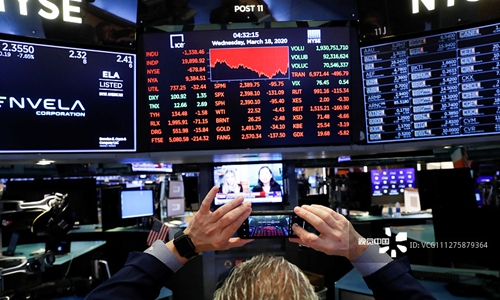How will COVID-19 change the world economy?
Source:Xinhua Published: 2020/5/5 19:08:40
Author Yuval Noah Harari says global cooperation solves problems

A trader takes a picture of screens displaying trading information in the New York Stock Exchange in New York, US on March 18. Photo: VCG
The world has rarely seen, if ever, four market circuit breakers and negative oil prices during the same period, while numerous planes are grounded in some of the world's busiest airports and production has stopped in plants across the world.
The sudden outbreak of the novel coronavirus disease, or COVID-19, has frozen the global economy and presented the toughest financial outlook in decades.
Can the world economy recover? Will there be a transformation in globalization and supply chains? What are the opportunities after the pandemic?
Those are questions concerning the well-being of humankind, and demand immediate answers.
Hope amid recession
"It's just gut-wrenching," dairy farmer Jason Leedle from the US state of Wisconsin, who has recently had to dump more than 10 tons of milk each day, told visiting Reuters reporters.
Mass closures of restaurants and bakeries have driven down demand, while logistics are not up and running as usual.
"All I can see is that line going down the drain," Leedle said.
The extraordinary picture reflects the obvious toll of COVID-19 on the economy. The International Monetary Fund (IMF) projects that the global economy is on track to contract sharply by 3 percent in 2020, making it the worst recession since the Great Depression of the 1930s.
Cumulative loss to global GDP over 2020 and 2021 from the pandemic could be around $9 trillion, greater than the economies of Japan and Germany combined, the IMF has also said.
One cannot help but ask: Is it going to be a long-term recession, or just a short-period contraction?
The IMF predicted in a report published in April that the COVID-19 outbreaks in most countries will peak in the second quarter and then subside in the second half of this year.
The report also expects that global growth in 2021 will rebound based on that assumption. But it also warns that the recession could go deeper and last longer for lack of global coordination.
Stephen Roach, a senior fellow at Yale University's Jackson Institute of Global Affairs, told Xinhua recently that unlike the financial crisis in 2008-09, when "a crisis began in the financial sector and spread to the real economy," today's crisis is one "that has begun in the real economy and spread back to the financial sector," as countries worldwide try to contain the spread at the expense of massive lockdowns and the halting of economic activities.
Unprecedented policies to resume production, ease financial pressure, boost market confidence and prevent debt risks have been rolling out in each country, while the world waits to see if the measures work.
China and supply chains
COVID-19 has disrupted global supply chains, particularly those among multinational corporations, making them rethink the relationship between interest and stability.
The epidemic will function as a catalyst to accelerate the shift of global supply chains, according to media outlets.
The idea for future supply chains is nothing but to strike a new balance between cost savings and supply chain resilience, Gu Qingyang, an associate professor at the Lee Kuan Yew School of Public Policy at the National University of Singapore, told Xinhua in a recent interview.
A recent survey by the American Chamber of Commerce in China and PricewaterhouseCoopers (PwC) showed that almost 70 percent of US companies say they have no plan to relocate production to outside of China due to COVID-19.
"We are very confident in the Chinese market. We will make another successful year with partners in China," Jean-Paul Agon, chairman and CEO of L'Oreal Group, has told Xinhua recently.
China has the world's most complete industrial support system and ecological system, abundant financing ability, a vast high-quality workforce, and increasing scientific and technological innovation ability, Gu said. "China occupies a central position in the global industrial chain and supply chain," he added.
Beyond economy
Emergencies "fast-forward historical processes," wrote Yuval Noah Harari, the author of Sapiens, Homo Deus and 21 Lessons for the 21st Century, in an article titled The world after coronavirus on the Financial Times website.
When countries are in trouble and face an economic slump, there are signs that skepticism of globalization resurfaces, along with decoupling theories. Some say the pandemic is one of the latest tests for globalization.
The advantages of the powerful deployment of labor and resources - thanks to globalization - will not be easily altered by the COVID-19 pandemic, which will wane eventually.
A global crisis needs a global response. From the research and development of drugs and vaccines, to information sharing and resource mobilization, none of these can live without global efforts and coordination. As Harari wrote, "both the epidemic itself and the resulting economic crisis are global problems. They can be solved effectively only by global cooperation."
The world has witnessed quick actions to strengthen global governance, which is now embracing opportunities to upgrade itself.
The Group of 20 has set out agendas ranging from stimulus plans and energy security to debt alleviation within a month; the UN, the IMF, and the World Bank have all beefed up preparations for post-pandemic economic recovery. Meanwhile, the international community is joining hands to promote information sharing and address medical supply shortages.
In a world that is best defined as a community with a shared future for mankind, a concerted response from all countries to overcome the COVID-19 pandemic will go a long way toward an early economic recovery.
RELATED ARTICLES:
Posted in: ECONOMY,BIZ FOCUS